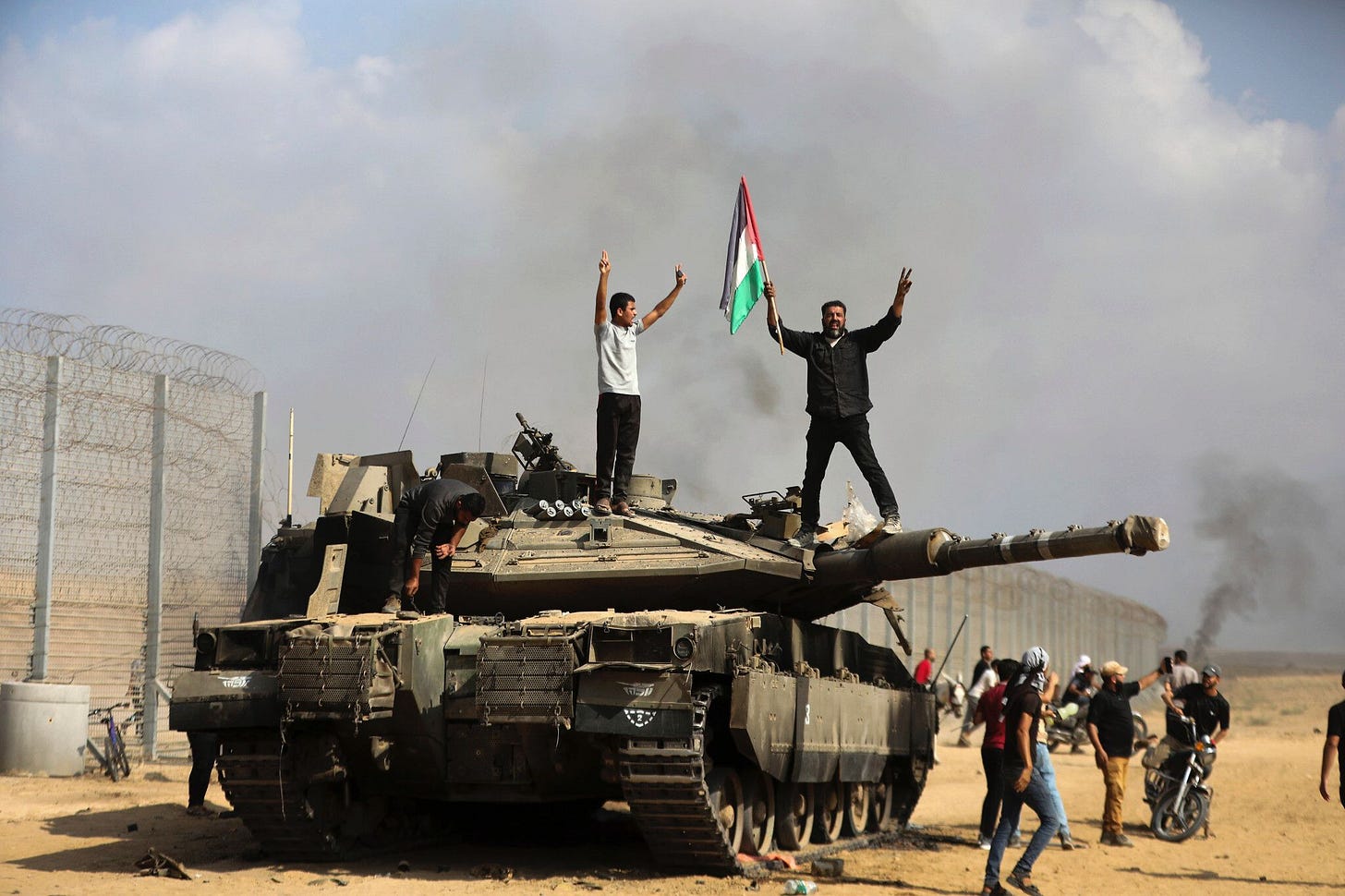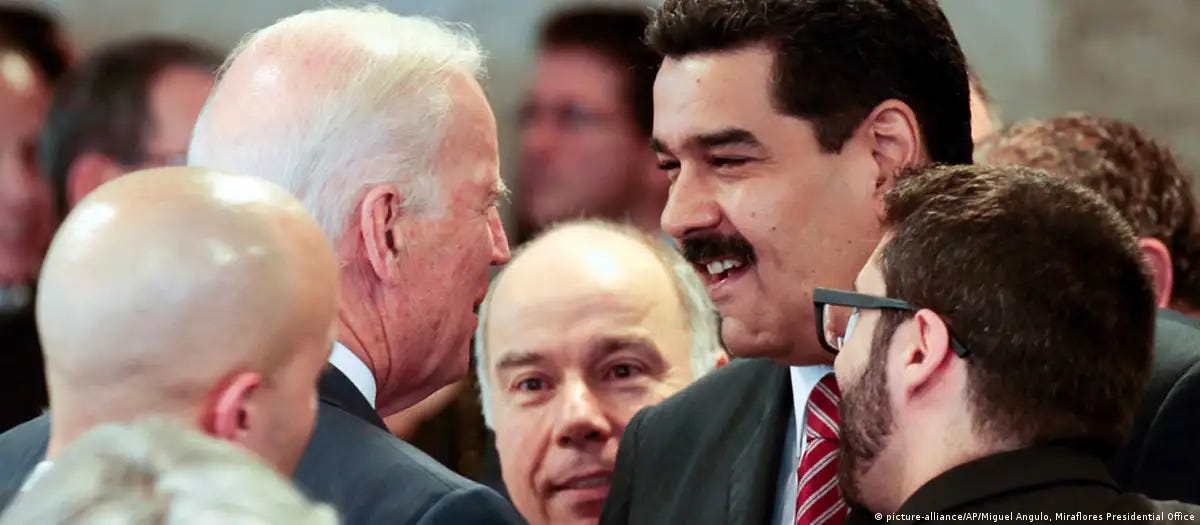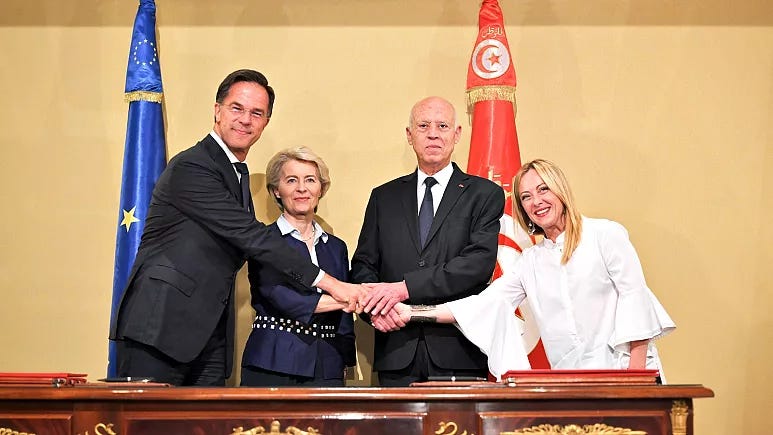This week - Gaza offensive, US-Venezuela deal, Citgo, Tunisia rejects EU aid
Week of October 9th, 2023.
This week we are starting with a brief mention of the Gaza offensive that started on Saturday. We are paying attention to the timing, as we just spoke about Arab-Israeli normalisation —and changing relations more broadly in the region.
We also have some points to make regarding US-Venezuela negotiations, as we begin to see the results. We are giving attention to a possible presidential candidate: Manuel Rosales. We also believe this will be a busy week for this issue. The fate of Citgo, the most prized overseas asset, will likely be decided by Friday.
We are continuing our coverage of Tunisia’s agreements with the EU. President Kais Saied has rejected financial aid linked to an immigration deal with Italy — just as the country sinks deeper into its growing debt.
Finally, in the Central Banks section, we are discussing the IMF and World Bank meetings in Marrakesh, and recent and upcoming monetary policy decisions in Peru and Russia.
Gaza offensive takes Israel by surprise

On Saturday morning, an offensive by Hamas and other Gaza-based groups took the Israeli military by surprise. It included a barrage of rockets, motorised paragliders, and divers, and took over Israeli army outposts and settlements. This attack has been characterised by kidnappings of military personnel and civilians alike, taken as hostages possibly to demand the release of Palestinian prisoners. Prime Minister Benjamin Netanyahu’s response has not been unexpected: a declaration of war and indiscriminate bombardments on the Gaza Strip, levelling civilian buildings to the ground. The day also marks exactly 50 years since the 1973 war, where Egypt and Syria coordinated a joint, surprise attack on Israeli positions.
The offensive was well planned. Gaza spokespeople have been bringing up recent provocations, such as the mistreatment of Palestinian children and the desecration of the Al Aqsa Mosque. However, the timing is key given efforts for normalisation between Israel and Arab countries, which started under the Trump administration. The renewed hostilities are likely to put this process on hold, at the very least. Beyond that, it was a question of if, not when, Palestine was going to burst.
The week before, US National Security Adviser Jake Sullivan argued that “the Middle East region is quieter today than it has been in two decades”. However, the Gaza Strip has been kept as “an open-air prison” for 15 years by Israel, according to Human Rights Watch. The strategic mistake was not to do with failing to uncover the attack before it took place. Instead, it was believing that 2 million desperate and disenfranchised Palestinians, 70% of whom are refugees from other parts of the historic region, were not going to attempt a violent act such as this.
US-Venezuela deal

Negotiations between the governments of the US and Venezuela are beginning to show results. An agreement was made public on Thursday, whereby the two will work together in deportations of “Venezuelans who do not have the legal basis to remain in the US”. Venezuelan migrants had been granted temporary protection status (TPS) in 2021. The two parties would have agreed on a comprehensive deal. It could include sanctions relief, releasing prisoners on both sides, a guarantee that the primaries will not be interfered with, and an election calendar.
Are primaries in the deal?
Maria Corina Machado is still banned from holding public office, while she is by far the frontrunner among all opposition candidates. The “hidden” reason for the ban is likely her hardline stance, not just against President Maduro, but anything resembling socialism more broadly. Chavistas fear a purge if she were to win the presidency. She called for military intervention and continues to support broad economic sanctions. Could she be sidelined by the White House and other sectors of the opposition?
Late on Sunday, Henrique Capriles, the second favourite candidate, pulled out of the race arguing for pragmatism, since he is barred from public office. Manuel Rosales, the governor of Zulia state, on Friday called for coordinated action to recover frozen overseas assets, after he met with other President Maduro and other opposition governors two weeks ago. On Thursday, in the state capital of Maracaibo, supporters of Capriles’ Primero Justicia and Machado’s Vente Venezuela were seen fighting each other. Rosales had backed Capriles’ candidacy, though he has explicitly not ruled out running for president himself.
Citgo to settle by Friday

Citgo, Venezuela’s largest overseas asset, must settle with Group 1 creditors by Friday, in order to forestall Judge Stark’s sale process order and the risk of certiorari petition being denied. The firm is a subsidiary of state oil firm PDVSA and manages refineries and petrol stations across the US. It would be a critical asset in Venezuela’s economic recovery. In 2019, it was seized by the Trump administration and handed over to the Venezuelan opposition’s “Ad-Hoc Board”, organised in the self-styled “interim government” under Juan Guaidó.
Citgo itself has recovered with up to $5bn, which would be enough to settle its own debts. However, a Delaware court ruled that it was an “alter ego” of the Venezuelan government, due to actions by Guaidó’s team; which have resulted in claims increasing from under $5bn to $23bn instead. This was explained in depth by Professor Francisco Rodríguez in the Financial Times. The process involved a possible corruption case. José Ignácio Hernández, the opposition lawyer meant to protect Citgo, had previous connections with creditors Crystallex and ConocoPhillips. He was made to resign, but there was no investigation into possible misdeeds.
On October 6th, Venezuelan Attorney General Tarek William Saab issued an arrest warrant against Guaidó, who now lives in Miami, Florida. The argument is that the interim government used Venezuelan overseas assets to finance itself directly and led to the “alter ego” ruling, adding $19.6bn to Citgo’s debt. This week, we will have to see if negotiations between Caracas and Washington DC provide a solution to save Citgo from creditors.
Tunisian President rejects EU deal

President Kais Saied has rejected financial aid from the EU that came as part of an immigration deal initiated by Italian Prime Minister Meloni in summer 2023. Representatives from the EU made two official visits to Tunisia in 2023 to discuss the matter of immigration and Mediterranean crossings, which has seen a spike in recent times. While officials hailed the deal as a success, some EU countries such as Germany remained sceptical over Tunisia’s ability to control and prevent immigration to Europe, as well as human rights concerns over reported abuse towards migrants in Tunisia by authorities and attacks by mobs fuelled by the President’s controversial anti-immigration speech earlier this year. This was also preceded by another rejected deal from the IMF to bring some debt relief to the country.
Unclear path for Kais Saied
Kais Saied was elected under a populist platform, promising to end years of political crisis and crack down on corruption. As the crisis grew during the pandemic, he initiated a self-coup by sacking the prime minister and closing the parliament. Since then, he has been focusing on undermining members of the opposition without implementing any policies to address the myriad of problems that the country is facing. Political analysts project that Kais Saied is slowly running out of allies both domestically and abroad, which will inevitably undermine his ability to cling to power.
Debt crisis
Tunisian debt has grown significantly over the years, reaching over 92% of the country’s nominal GDP in 2022. Now that President Saied has rejected two important funding agreements, efforts to relieve Tunisia’s debt crisis will become more complicated over time. Despite this, the Tunisian government is looking at alternative strategies to tackle the issue. Over The Hedge will be monitoring Tunisia’s debt crisis over the coming weeks.
Central banks
Central Bank governors and financial leaders from around the world are set to meet in an annual meeting organised by the IMF and World, held in Marrakesh, Morocco. The meeting is set to begin on Monday the 9th of October and conclude on Sunday the 15th of October. Among the topics expected to be discussed during the meetings include debt stress in low-income countries and climate change, specifically in terms of increasing funding for sustainable development. A more in-depth analysis of the meetings will be provided the following week.
The Banco Central de la Reserva del Peru lowered interest rates again on October 5th, straight after it did so on September 14th. After the two 25 basis points cuts, the target rate stands at 7.25%. We will hear again from them on November 9th. Peru is currently in a “technical recession” with a small GDP contraction throughout the first half of this year. Lima declared a state of emergency in various regions due to El Niño, a climate phenomenon; continuing political strife; and growing crime.
This month we will be listening in on decisions by the central bank of Indonesia on the 19th, Chile, and Turkey on the 26th, and Russia on the 27th. The last had been keeping rates relatively low at 7.5% between autumn 2022 and this summer. Moscow had brought some stability to the rouble with capital controls and high rates just after its invasion of Ukraine. However, since July it has had to hike quickly up to 13% in September, to combat inflation. The export ban on diesel and other fuels was also intended for this purpose.
The editors: Elias Ferrer and Slim Mezlini.






Is the headline "Citgo to settle by Friday" a prediction that they will settle or simply saying that they have until Friday to settle?